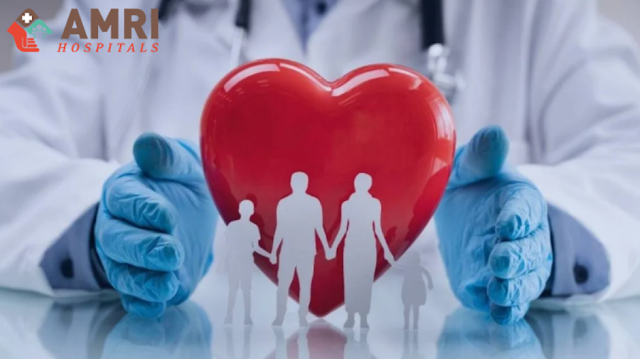When You Should Consider the Services of a Cardiologist?
Over 17.9 million individuals die from cardiovascular disease (CVD) each year. Cardiovascular disease (CVD) is a leading cause of death worldwide; therefore, protecting your heart is critical. Despite its fist-sized size, the organ works harder than every organ in the body, even though it is smaller.
It also operates nonstop, with a daily heart rate of around 115,000 beats. Working without taking a break may put a lot of stress on the heart. In contrast to you, the machine has no control over whether or not it continues to work for a little moment. Prioritizing the overall health of one's heart is essential. If you are not attentive, you might be postponing its treatment with terrible effects.
The following are some common symptoms that require you to visit a Cardiologist:
1.
Inheritance
Genetics may have a role in the development of
heart disease. It would help if you researched to be 100% certain. Create a
family tree by gathering information from all of your family members, including
those who live far away. Get your cholesterol and blood pressure checked if you
observe any trends in your blood pressure or cholesterol levels.
2.
Heartache
The most prevalent symptom of cardiac disease
is chest discomfort. In addition to indigestion, there are many other possible
causes of discomfort but you can't take any risks. Chest aches are a warning
indication of a heart attack. If you don't take it seriously, it might lead to
your demise. Do not overlook any chest discomfort you may have.
3.
Related Afflictions
There are several additional signs and
symptoms that you should be aware of and chest discomfort. It's essential to
get medical attention if you have excessive exhaustion or trouble breathing.
There is a possibility that this is not a major or even heart-related issue.
But what if it is? Is it worth the risk to you? Symptoms like dizziness,
fainting, a heavy sensation in the heart, and severe indigestion should be
checked out.
4.
High Cholesterol
A rise in cholesterol is scary since there are
no obvious indicators of the problem. Because of this, you must have frequent
medical appointments and monitor the norm. Hyperlipidemia is a crucial cause of
heart disease; therefore, watch your cholesterol levels. Maintaining a
nutritious diet is the most excellent method to keep your heart healthy.
5.
Smoking Habit
Smoking is a harmful habit that may lead to
various heart-related issues. Another risk factor for cancer and a rise in
blood pressure may be seen in those who smoke. You have to work at getting rid
of this, so keep that in mind. A visit to the cardiologist is necessary if you
have a smoking history.
6.
Diabetic Hypertension
Another indicator of a cardiac problem is high
blood pressure. You need to keep it under control. At the very least, you
should get a check-up once a month. High blood pressure is also a sign of
stroke, so be on the lookout for it. Don't put it off any longer if you've
always had high blood pressure.
7.
Diabetes
Diabetes and heart disease are intimately
linked, as you may not be aware. It's because low or high blood sugar levels
have a devastating impact on the capillaries of the heart and circulatory
system. Additionally, they affect how well they work. It increases the risk of
cardiovascular disease. Preventive methods for heart disease may be learned by
seeing a cardiologist.
8.
Kidney Disease can Affect the Heart
There is a relationship between kidney issues
and an increased risk of heart disease. Kidney illness may increase one's risk
of acquiring artery disease.
9.
Unusual Workout
Despite all of the advantages, regular physical
activity might adversely affect one's cardiovascular system. If you combine a
high-intensity exercise with risk factors, you may be putting your health at
risk. Always get the advice of a medical professional before taking any intensive
workout.
10. Preeclampsia
Only women, especially pregnant women, have
this specific symptom. During pregnancy, preeclampsia causes a rise in blood
pressure. It increases the risk of cardiovascular disease and high blood
pressure. If you have been told you have preeclampsia, you should see your
doctor as soon as possible.
11. Arterial
Disease of the Lower Limbs
The arteries are in charge of transporting
blood to the heart and the rest of the body. Now, if you've been diagnosed with
vascular disease, that's something to be concerned about. Heart disease is a
common ailment in the majority of situations. A visit to the cardiologist is a
sound decision.
12. Genetically
Inherited (CHD) Heart Disease
Regular checkups are necessary if you were
born with congenital heart disease (CHD). It's a frequent fallacy that CHD
patients don't need follow-up care once their treatment is complete. Said, this
isn't true. You must follow the regulations and visit your doctor regularly to
monitor your heart health.
Conclusion
You must grasp the significance of the heart.
In the same way, failing to look for its well-being might have severe
ramifications for you. It's dangerous and may potentially be fatal in a matter
of minutes. Numerous other risk factors should prompt you to see a cardiologist,
in addition to the ones mentioned above.
However, most of them may be avoided by making a few easy alterations to one's daily routine. For a long and healthy life, you must make significant adjustments in your lifestyle. Find the best cardiologist in Kolkata to ensure good heart health.
Also, read this: How to Choose the Right Dentist for Your Family?




Comments
Post a Comment